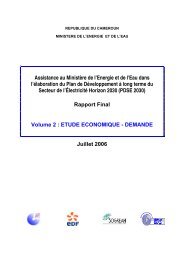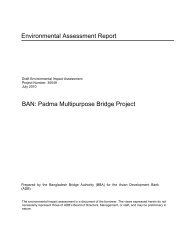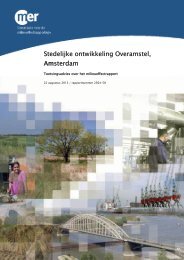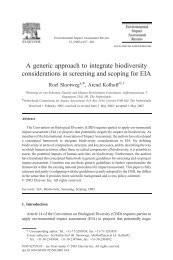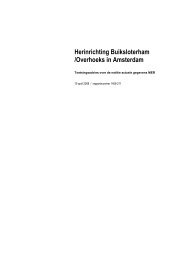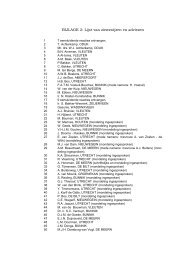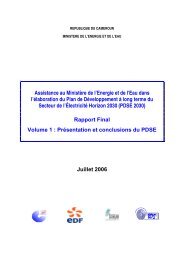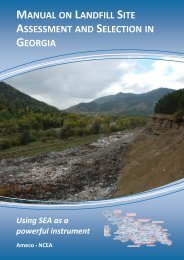Scoping Advice for the Dutch IWRM Support Programme Rwanda
Scoping Advice for the Dutch IWRM Support Programme Rwanda
Scoping Advice for the Dutch IWRM Support Programme Rwanda
You also want an ePaper? Increase the reach of your titles
YUMPU automatically turns print PDFs into web optimized ePapers that Google loves.
1. When it comes to data collection, <strong>the</strong> NCEA recommends to:- Identify <strong>the</strong> initial basic surface water parameters that are a necessity in order to understand<strong>the</strong> basic surface water run off and make initial catchment water balances;- Explore at a later stage <strong>the</strong> knowledge and in<strong>for</strong>mation available on <strong>the</strong> hydrology and groundwater system of <strong>the</strong> catchment areas;- Identify at all national governmental and local levels what kind of data collection is alreadytaking place. Verify whe<strong>the</strong>r all relevant stakeholders are involved and no opportunities toavail of data are being missed (e.g. in<strong>for</strong>mation from mining department and knowledgeinstitutes, including possible regional knowledge institutes);- Also identify how <strong>the</strong> data, being collected at <strong>the</strong> RWRD, could assist <strong>the</strong> o<strong>the</strong>r governmentalInstitutions related to water management. Data sharing and showing benefits to o<strong>the</strong>rs willenhance involvement and engagement by o<strong>the</strong>r relevant stakeholders;- Look into possible solutions <strong>for</strong> sustained data sharing between organisations. Verify whichways of data sharing are possible and check which technological or institutional options willbe <strong>the</strong> most optimal, also in <strong>the</strong> long run.Note: Verify to what extent <strong>the</strong> present Management Plan process covers <strong>the</strong> above steps in orderto avoid duplication of ef<strong>for</strong>ts.Data managementThe Master Plan team of SHER consultants is currently designing a Management In<strong>for</strong>mationSystem (MIS). This MIS has all potential to become a good central system <strong>for</strong> data storage,management, assessment and monitoring, and could <strong>the</strong>re<strong>for</strong>e function as <strong>the</strong> WRAM <strong>for</strong>eseen by<strong>the</strong> EKN.As stated in <strong>the</strong> previous section <strong>the</strong>re are doubts whe<strong>the</strong>r <strong>the</strong> MIS will include all relevant waterrelated services such as flood buffering, water storage, sediment removal, purification, andproduction services <strong>for</strong> local livelihoods.The consultancy assignment does not <strong>for</strong>esee in <strong>the</strong> actual implementation of <strong>the</strong> MIS <strong>for</strong> day-todayuse. Implementation and capacity development is not part of <strong>the</strong>ir ToR, nei<strong>the</strong>r is transfer ofskills and knowledge to <strong>the</strong> RWRD staff on how to run, fill and maintain <strong>the</strong> MIS. Ano<strong>the</strong>runcertainty is how <strong>the</strong> data flow from all <strong>the</strong> stakeholders will be continuously added to <strong>the</strong> MIS.2. In relation to data management, <strong>the</strong> NCEA recommends to;- Not invest in <strong>the</strong> development of a new WRAM system but work with <strong>the</strong> MIS that is beingdeveloped;- Verify if <strong>the</strong> MIS consists of all relevant data;- Focus on making <strong>the</strong> MIS and possible linkages operational, once <strong>the</strong> Master Plan iscompleted. Ideally this is taken up as soon as possible as <strong>the</strong> MIS is being designed and filled‘as we speak’;- Keep investing in updating and checking <strong>the</strong> relevance of <strong>the</strong> MIS ensuring its full integrationin <strong>IWRM</strong> decision-making. Based on <strong>the</strong> Master plan, plan logical moments to assess andimprove <strong>the</strong> MIS. Trying to do all at once will be a challenge and can lead to a slow down in<strong>the</strong> current development of <strong>the</strong> monitoring system.15






